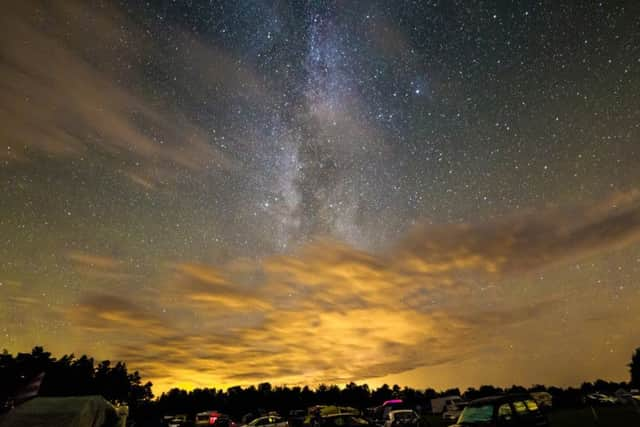Yorkshire Dales and North York Moors aim to cut light pollution to protect stargazing
Both the North York Moors and the Yorkshire Dales national parks offer breathtaking sights for stargazers and by backing a nationwide Big Dipper campaign, park authorities want local people to help them keep it that way.
They are urging businesses and homeowners to limit light pollution by adopting a “smarter” approach to the use of external lighting so that the impact of “piercing” beams emitted by powerful LED floodlights and security lighting can be reduced.
Advertisement
Hide AdAdvertisement
Hide AdProperty owners can help by ensuring that beams of light from exterior lamps are dipped downwards, rather than projected outwards.


Mike Hawtin, outdoor activity tourism officer for the North York Moors National Park, said: “We’re not expecting property owners to struggle in the darkness or compromise the functionality of their lighting. However, there are situations where a single poorly installed exterior light can be seen for miles around by emitting a very powerful harsh blue-white beam which blots out views of the stars if it is angled too far outwards.
“By simply re-positioning the beam angle or ensuring lamps are on a motion sensor we can individually help reduce our contribution to light pollution.”
Richard Darn, an amateur astronomer from Barnsley who is helping to promote the Big Dipper campaign in North Yorkshire’s national parks, said the use of harsh outdoor lighting was now far more commonplace.
Advertisement
Hide AdAdvertisement
Hide Ad“Our view of the stars over the years has become much diminished and one of the reasons is that cities have grown outwards,” he said. “The other issue is the cheapness of lighting, particularly LED lighting that you can buy from DIY chains. It’s very cheap to buy and to run, and the effect of that is to create much more light pollution.
“Car parks, timber yards, farmyards now have much more punishingly bright lights. I notice it travelling around Yorkshire, particularly over the last two or three years. Some areas that were very dark now have bright, piercing industrial grade lighting.”
Mr Darn said he understood that many businesses and residents use lighting to deter criminals, but that safety did not have to be comprised.
“The last thing anyone wants to do is suggest that people turn lights off and feel more insecure,” he said. “It’s about thinking about different kinds of lighting and how you use it in a different way.”
Advertisement
Hide AdAdvertisement
Hide AdHe suggested that motion sensor lighting is an efficacious way to protect properties because it alerts the occupier to an intruder.
Both the Moors and Dales National Parks have Dark Sky Discovery sites that attract stargazers from outside the area, and since they jointly held their first Dark Skies Festival in 2015, locations where astronomy events have taken place have seen growing visitor interest in stargazing and astrotourism.
Making the case for action on light pollution, Helen Dalton, destination co-ordinator for the Yorkshire Dales National Park, said: “We’re keen to protect our dark skies as a beautiful natural resource which has really engaged visitor interest and importantly is also helping preserve our wildlife.”
The fourth Dark Skies Festival in the Yorkshire Dales and North York Moors will take place next year from February 15 to March 3.
HOW YOU CAN HELP
Advertisement
Hide AdAdvertisement
Hide AdThe Big Dipper campaign sets out a series of actions that people can take to reduce light pollution.
It asks people to ensure lights point down and are fully shielded, to only illuminate areas they need to and to use a timer or motion sensor to prevent lights staying on all night.
A 500 lumens light is sufficient to illuminate a back garden, it recommends, while LED units of 3,000k and below produce a warmer colour which is less harmful to the night-time environment.
The National Parks are backing the campaign as they prepare for a number of stargazing and dark sky events during the October half-term.
